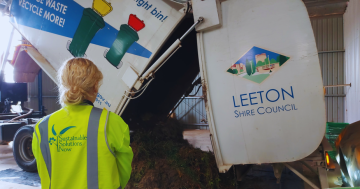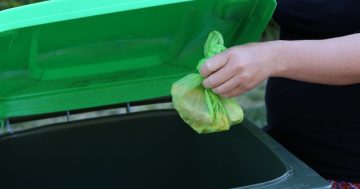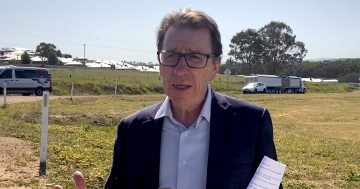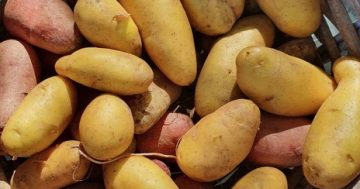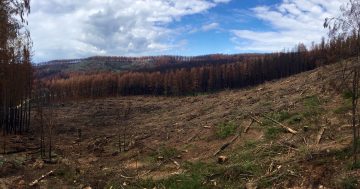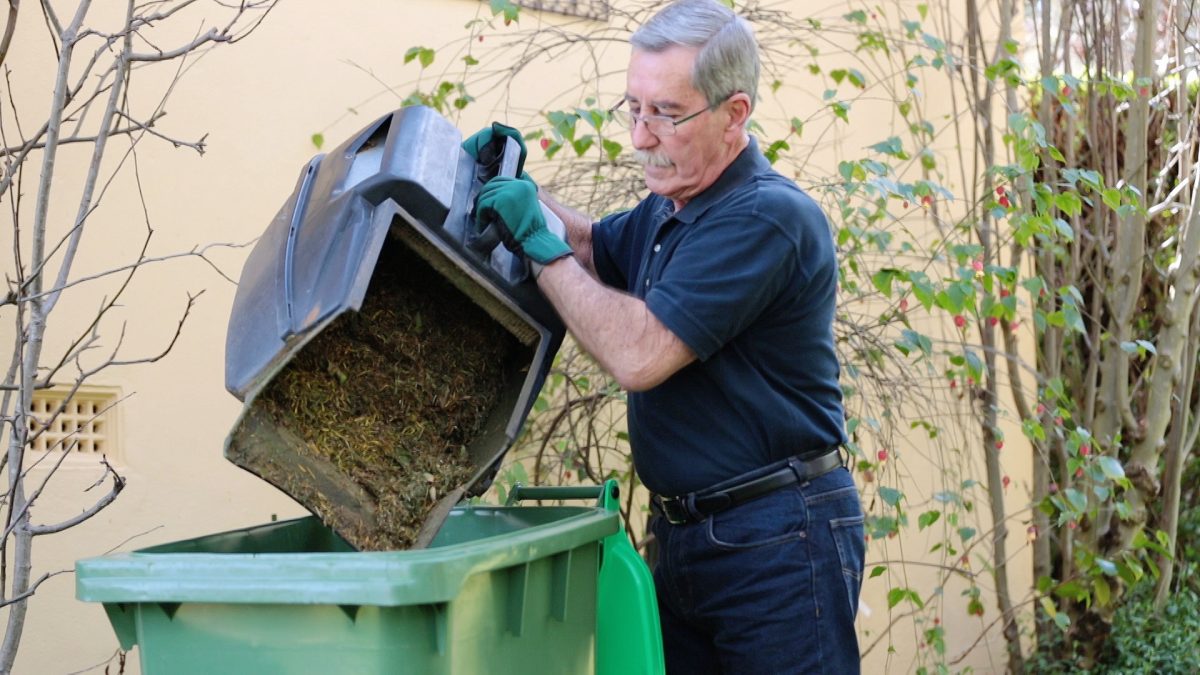
A new three bin system is coming to six council areas in the Riverina from 1 July and will see the introduction of an organics bin for green waste. Photo: Facebook/Halve Waste.
Green waste be gone!
If you live in townships within the council areas of Berrigan, Edward River Council (Deniliquin), Greater Hume Shire, Hay Shire, Leeton and the townships in the northern area of Federation council, the way you dispose of rubbish is changing.
A new system of waste collection is starting on 1 July to divert organics away from landfill with a green lidded bin introduced to collect things such as fruit and vegetable scraps, meat, fish and bones and garden prunings.
The six councils all obtained funding to introduce the organics bin through the NSW EPA, Go FOGO Round 1 grant program. They will join Murray River and Albury City in delivering a consistent waste and recycling message across the Murray and Riverina regions.
The new ‘three bin system’ also means some changes to collections with the red lidded bin moving to a fortnightly pickup.
The system is a Halve Waste initiative aimed at making the most of the waste and turning it into resources that can be used to help the community.
Residents will receive three 240-litre bins, with organics collected weekly, and recycling and general waste collected fortnightly.
The announcement on Greater Hume Shire’s Facebook page was met with mixed reactions and questions around opting out of the green bin if it wasn’t required.
Kirstie Parker suggested a choice to have a compost bin rather than the green bin would have been a good idea and Karl Zermat thought free green waste vouchers would have been better.
“What’s the rate increase for an additional bin and something I won’t use as I compost myself,” asked Tania Sneddon, who also wanted to know how the waste was separated and sorted.
“From what I understand the rubbish doesn’t get sorted and dumped as they say anyway. I don’t like the idea of paying for my green waste to be taken away and then sold on. If they are selling it as resources for the community there shouldn’t be a need to charge us!
“Also asking for the majority of the elderly that live in the region who have been managing this in their own gardens? Plus, will you be selling back our compost to the community for a profit? I’d also like to know how the waste is actually separated/dumped and sorted from each of the three bins. Hmmm?”
Many rural residents such as Glenellen’s Kylie Felton have been dealing with their own green waste on their property for years.
“We are lucky enough to have chooks so a lot of our green waste goes there, but not everybody has chooks,” said Kylie.
“I’d also like to know if we are able to put our noxious weeds in there, things like catheads, flat weed and marshmallow.
“I think the idea has merit and is a step in the right direction. If we are not already in the throes of a climate emergency we are certainly heading towards one and whether this is tokenistic or perceived as greenwashing, I say at least start the conversation, maybe it will help.”
Residents will be receiving a kitchen caddy and compostable liners about two weeks before the start of the new collections.
Greater Hume says about half the content of the average household rubbish bin is organic material.
On the FAQ page of its website it says there is not an option to opt out of the new bin system but that it could be seen as an extension to the great work householders who compost at home are already doing.
It says the new service can accept things that your compost heap or pet may not like – things such as citrus, onions, bones, weeds and diseased and infected fruit or vegetables.
“You can put in all your food scraps including fish, meat and bones, coffee grounds and cooked foods. Garden waste such as prunings, grass clippings, sticks, weeds and flowers can also be included.
“However, you cannot include things like plastic bin liners, general household waste, treated or laminated timber or old clothing. These need to go in your general waste bin,” the information explained.
Greater Hume said residents could expect a slight increase in garbage collection charges.
“Every year your garbage charge increases slightly in line with inflation. Next year there is an additional change due to the introduction of an organics bin to every household (who currently already have a waste collection service) from July 2024. More details about these charges will be available closer to the installation of the fees and charges.
“As a community we pay for many services as part of our rates that benefit the community, even if every individual resident may not utilise them. Reducing the pressure on landfill and generating a valuable resource for our region’s agricultural industries helps council to reduce the cost of landfill space into the future.”
Leeton, Berrigan and Greater Hume will be changing from a two to three bin system and Edward River, Hay shire and the northern Federation townships will move from a one to three bin system.
For more information contact your local council or visit Halve Waste.







